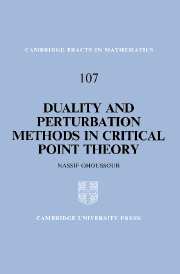Book contents
- Frontmatter
- Contents
- Preface
- Introduction
- Chapter 1 Lipschitz and Smooth Perturbed Minimization Principles
- Chapter 2 Linear and Plurisubharmonic Perturbed Minimization Principles
- Chapter 3 The Classical Min-Max Theorem
- Chapter 4 A Strong Form of the Min-Max Principle
- Chapter 5 Relaxed Boundary Conditions in the Presence of a Dual Set
- Chapter 6 The Critical Set in the Mountain Pass Theorem
- Chapter 7 Group Actions and Multiplicity of Critical Points
- Chapter 8 The Palais-Smale Condition Around a Dual Set – Examples
- Chapter 9 Morse Indices of Min-Max Critical Points – The Non Degenerate Case
- Chapter 10 Morse Indices of Min-Max Critical Points – The Degenerate Case
- Chapter 11 Morse-type Information on Palais-Smale Sequences
- Appendices by David Robinson
- References
- Index
Preface
Published online by Cambridge University Press: 18 December 2009
- Frontmatter
- Contents
- Preface
- Introduction
- Chapter 1 Lipschitz and Smooth Perturbed Minimization Principles
- Chapter 2 Linear and Plurisubharmonic Perturbed Minimization Principles
- Chapter 3 The Classical Min-Max Theorem
- Chapter 4 A Strong Form of the Min-Max Principle
- Chapter 5 Relaxed Boundary Conditions in the Presence of a Dual Set
- Chapter 6 The Critical Set in the Mountain Pass Theorem
- Chapter 7 Group Actions and Multiplicity of Critical Points
- Chapter 8 The Palais-Smale Condition Around a Dual Set – Examples
- Chapter 9 Morse Indices of Min-Max Critical Points – The Non Degenerate Case
- Chapter 10 Morse Indices of Min-Max Critical Points – The Degenerate Case
- Chapter 11 Morse-type Information on Palais-Smale Sequences
- Appendices by David Robinson
- References
- Index
Summary
The aim of these notes is to give a self-contained presentation of the min-max approach to critical point theory while emphasizing the role of duality and perturbation methods. Actually, this monograph originated in a project where we set out to show that duality is a fundamental concept that underlies many aspects of critical point theory. The goal was to try to reprove and improve selected results in min-max theory by exploiting the notion of dual families of sets and its ramifications. It turned out that, by adopting this point of view, the whole theory can be nicely developed and vastly enriched.
On the other hand, by perturbation methods, we mean the aspect of infinite dimensional critical point theory where, in order to deal with the possible lack of compactness or with the presence of degeneracy, one tries to modify the functional or the problem under study to a neighboring one that can be more manageable. We shall adhere to this methodology throughout these notes.
This monograph owes its existence to a very dear friend, Ivar Ekeland, who introduced me to non-linear analysis and, more importantly, influenced greatly my global vision of mathematics. Special thanks go to another dear friend, Bernard Maurey, for all the years of collaboration and from whom I learned so much. Many of the relevant examples included here are due to Gabriella Tarantello.
- Type
- Chapter
- Information
- Duality and Perturbation Methods in Critical Point Theory , pp. xi - xiiPublisher: Cambridge University PressPrint publication year: 1993



